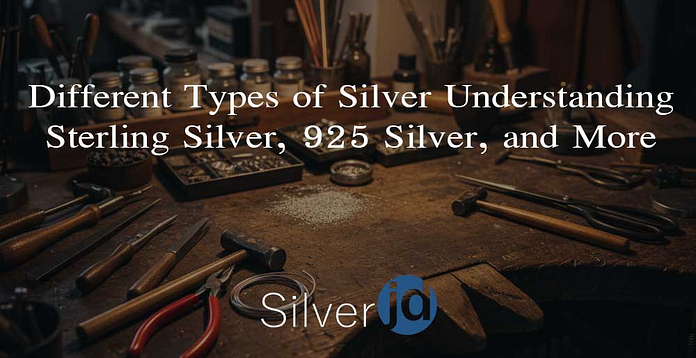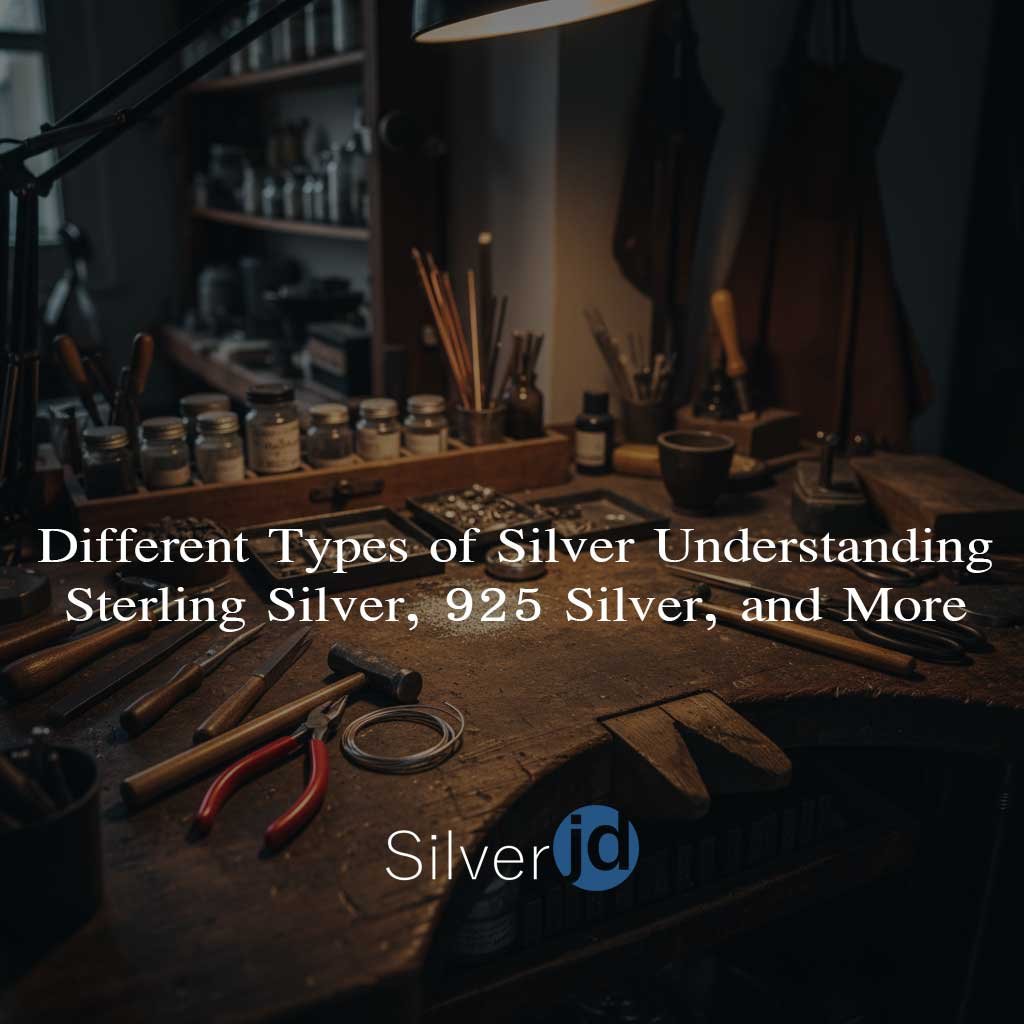In the UK wholesale jewellery market, understanding the different types of silver is crucial for jewellery retailers, wholesalers, and resellers. Silver has long been revered for its beauty, durability, and versatility, making it a top choice for jewellery production. However, not all silver is created equal. The type of silver used in a piece of jewellery can significantly influence its price, durability, and overall appeal.
In this guide, we’ll explore the various types of silver, including sterling silver, 925 silver, and other variations. We’ll also provide tips on identifying high-quality silver and discuss important B2B considerations, such as compliance, certifications (RJC, REACH, ASTM), MOQ (minimum order quantity), and lead times.

What is Sterling Silver?
Defining Sterling Silver for Wholesale Buyers
Sterling silver is one of the most popular types of silver used in wholesale jewellery in the UK. It is an alloy made by combining pure silver with other metals, usually copper, to enhance its strength and durability. Pure silver (99.9%) is too soft for everyday jewellery, so it is alloyed to make it more robust while retaining its shiny, lustrous appearance.
To meet industry standards, sterling silver must contain at least 92.5% silver, with the remaining 7.5% typically composed of copper or another metal. Sterling silver is ideal for creating jewellery that’s both durable and elegant, making it a top choice for retailers looking to offer quality pieces to their customers.
Is Sterling Silver Real Silver?
Yes, sterling silver is real silver. The addition of copper or other metals simply strengthens it, making it suitable for jewellery that will be worn regularly. Sterling silver strikes the perfect balance between beauty, durability, and affordability, making it a preferred choice for wholesale jewellery buyers in the UK.
What Does 925 Mean on Jewellery?
If you’ve noticed the number “925” stamped on jewellery, you may have wondered what it means. The “925” stamp signifies that the jewellery is made from 925 silver, which is another term for sterling silver. This indicates that the jewellery contains 92.5% pure silver and 7.5% other metals, typically copper.
The “925” mark guarantees the authenticity and quality of the silver, ensuring that your wholesale jewellery collection meets industry standards.
What is 925 Silver?
Understanding 925 Silver for Wholesale Jewellery Buyers
925 silver is simply another term for sterling silver, signifying that the piece contains 92.5% silver and 7.5% other metals, usually copper. The 925 stamp is essential for confirming that your wholesale jewellery is made with genuine, high-quality silver.
What is the Price of 925 Silver?
The price of 925 silver fluctuates depending on various factors like market conditions and craftsmanship. However, it remains more affordable than other precious metals like gold or platinum, making it a popular option for wholesale jewellery buyers in the UK.
Some key factors that affect the 925 silver price include:
- Market Conditions: The price of silver can vary due to global demand and supply.
- Jewellery Design and Craftsmanship: Custom or designer pieces will typically cost more than mass-produced items.
- Size and Weight: Larger or heavier pieces of 925 silver jewellery generally come at a higher price.
Despite price fluctuations, 925 silver offers a combination of affordability, durability, and luxury, making it an excellent choice for your wholesale jewellery business.
Other Types of Silver in Jewellery Manufacturing
While sterling silver (925 silver) is the most common type used in wholesale jewellery, other silver types are also used depending on the specific needs of the piece.
Fine Silver (999 Silver)
Fine silver, or 999 silver, is the purest form of silver, containing 99.9% silver. It is more expensive than sterling silver but much softer, making it less suitable for everyday jewellery. Fine silver is often used for decorative pieces or collector’s items where durability isn’t as crucial.
Argentium Silver
Argentium silver is a modern alternative to sterling silver. It contains a small amount of germanium, which helps prevent tarnishing and improves the metal’s durability. Argentium is a fantastic option for businesses looking for tarnish-resistant products to offer their customers.
Mexican Silver
Mexican silver typically refers to jewellery made in Mexico from sterling silver (925), though it can sometimes include fine silver (999). The term is more closely associated with the country of origin than a specific silver type.
Coin Silver
Historically, coin silver was made by melting down silver coins, but today, it generally refers to an alloy containing 90% silver. While once popular in jewellery, coin silver has been largely replaced by sterling silver due to its lower silver content.
The Properties of Silver – Durability and Tarnishing
Does Silver Rust?
Silver does not rust, making it an excellent choice for jewellery. However, silver can tarnish over time when exposed to sulphur or oxygen in the air. Tarnishing is a natural process that doesn’t compromise the metal’s integrity and can be easily cleaned.
How to Care for Silver Jewellery
To keep your silver jewellery in excellent condition, follow these tips:
- Cleaning: Regularly polish silver jewellery with a silver cleaning cloth to remove tarnish. For stubborn tarnish, soak the pieces in warm, soapy water, scrub gently, rinse, and dry.
- Storing: Keep silver jewellery in a cool, dry place away from direct sunlight and humidity. A tarnish-resistant pouch or box will help protect your jewellery from tarnishing.
How to Identify High-Quality Silver Jewellery
When shopping for wholesale silver jewellery, look for these indicators to ensure quality:
- Hallmarks: Authentic sterling silver jewellery will be stamped with the 925 mark or another recognised certification symbol.
- Colour and Shine: 925 silver should have a bright, shiny surface with a cool white sheen. Dull or tarnished surfaces may indicate low-quality silver.
Weight: Quality 925 silver will feel substantial in weight. Lightweight pieces could mean the silver has been diluted with other metals.
Shop for high-quality silver jewellery here.
If you’re a retailer or wholesaler looking to expand your silver jewellery inventory, explore our wholesale silver earrings collection or browse our full catalog of 925 silver jewellery. We offer fast fulfilment, private label options, and volume discounts for bulk orders.
Conclusion
Understanding the different types of silver is essential for jewellery lovers and wholesale jewellery buyers in the UK. Whether you’re seeking affordable yet durable 925 silver or high-end fine silver jewellery, each silver type has unique properties. By learning to identify high-quality silver, you can make informed decisions when sourcing jewellery for your business or personal collection.
Browse our collection of wholesale silver jewellery today and take advantage of our fast fulfilment and competitive prices.
FAQs:
What is sterling silver?
Sterling silver is an alloy made of 92.5% silver and 7.5% other metals, usually copper. It is commonly used in jewellery for its durability and aesthetic appeal.
Is sterling silver real silver?
Yes, sterling silver is real silver, containing 92.5% pure silver. The addition of copper enhances its strength and makes it ideal for everyday wear.
What does 925 mean on jewellery?
The 925 stamp indicates that the jewellery is made from 925 silver, or sterling silver, which contains 92.5% pure silver.
Does silver rust or corrode?
No, silver does not rust, but it can tarnish over time due to exposure to air and moisture. Tarnish can be easily removed with silver polish.
What is the price of 925 silver?
The price of 925 silver varies based on market conditions and craftsmanship. It is generally more affordable than other precious metals like gold or platinum.

